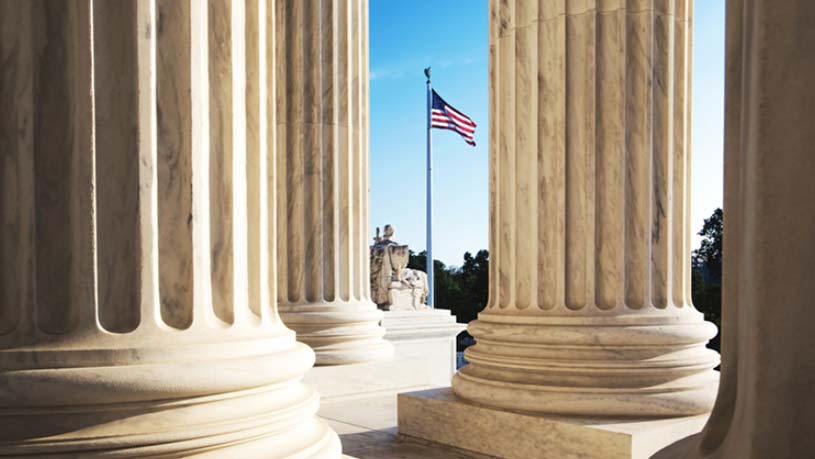Early Guidance Issued under H.R. 1, The One Big Beautiful Bill Act
Part of a series | The One Big Beautiful Bill Act Series

The guidance covers the new tax deductions on certain tips and overtime pay, Trump accounts, research and development expenditures, and expiring energy incentives.
H.R. 1, The One Big Beautiful Bill Act (the Act), was signed into law on July 4, 2025. The Act includes several significant changes that are relevant to companies for payroll, employment tax and employee benefits purposes, with some key provisions effective retroactively as of January 1, 2025. For additional background information, review our prior article.
The Department of the Treasury (Treasury) and the Internal Revenue Service (IRS) commenced issuing guidance explaining how certain provisions of the Act will be implemented. The guidance covers the new tax deductions on certain tips and overtime pay, Trump accounts, research and development expenditures, and expiring energy incentives.
Guidance on New Federal Income Tax Deductions for Qualified Overtime and Qualified Tips
No Changes to Federal Income Tax Withholding or Forms for 2025
The Act requires Treasury to issue updated tax withholding guidance to reflect the new deductions for qualified overtime and qualified tips and requires companies to include specified information on Form W-2 and Forms 1099. Pursuant to the Act, federal income tax deductions for qualified overtime and qualified tips are retroactive to January 1, 2025.
In August, the IRS announced that there would be no changes to tax withholding for 2025 and no changes to applicable IRS forms for 2025, including Form W-2, Forms 1099, and Form 941. In addition, the IRS announcement instructs employers to continue using current procedures for withholding and reporting for Tax Year 2025. The IRS noted that this guidance was intended to allow the IRS, businesses, and tax professionals sufficient time to implement changes required by the Act.
While the IRS confirmed there are no changes to forms or withholding for 2025 tax filings, guidance remains outstanding on how employers and tax filers can leverage existing forms for such filings. Guidance is expected to interpret the Act's transition rule that allows companies to use "any reasonable method" specified by Treasury to estimate the amount of qualified overtime and qualified tips for 2025. Employees and independent contractors also need to understand how they can obtain this information for Tax Year 2025, since IRS has confirmed that it will not be included on 2025 Forms W-2 and 1099.
Preliminary Treasury Guidance on Tipped Occupations
The Act includes a federal income tax deduction for qualified tips, effective for tax years 2025 through 2028. "Qualified tips" means cash tips received by an employee or an independent contractor in an occupation that customarily and regularly received tips on or before December 31, 2024. The Act required the Secretary of the Treasury to release a list of qualifying occupations by October 2, 2025.
On September 2, 2025, Treasury released a preliminary list of occupations that customarily and regularly received tips on or before December 31, 2024, and are therefore eligible to deduct qualified tips, subject to deduction and income limits. The list includes 68 different tipped occupations in areas such as personal services, beverage and food services, and transportation and delivery. Each occupation is assigned a Treasury Tipped Occupation Code (TTOC).
The list of occupations will be included as part of the upcoming proposed regulations from Treasury and the IRS. While Treasury and the IRS anticipate that the list will be substantially the same when published in the proposed regulations, changes are still possible. The proposed regulations are also anticipated to provide additional information on occupations that the Act specified were ineligible for the federal income tax deduction for tips, including accounting, health, law, actuarial science, athletics, brokerage services, consulting, financial services, or the performing arts. A public comment period is planned after the proposed regulations are released.
Companies should monitor for additional guidance on tax deductions for tips from Treasury and the IRS, including any updates to the list of tipped occupations and guidance on how occupation designations will be reported by companies and their workers for tax filings for 2026-28. In the meantime, companies should review the list of TTOCs and determine which of their employees or independent contractors who receive tips may fall within one of the listed occupations.
Draft 2026 Forms Released
The IRS released draft versions of several forms that will be key to implementing the qualified overtime and qualified tips federal income tax deductions for tax years 2026 through 2028. These forms remain preliminary and are subject to change until the IRS issues final versions.
The draft 2026 Form W-2 introduces a number of changes related to the new tax deductions. The existing Box 14 has been relabeled as Box 14a and reduced in size to accommodate a new Box 14b for the Treasury Tipped Occupation Code. The Form W-2 instructions were also updated to require employers to include qualified overtime and qualified tips in Box 12 using new codes TT and TP, respectively. (A new code TA applies to employer contributions to Trump Accounts, which are discussed in more detail below.)
Employees are instructed to use these amounts to determine their deductions using Schedule 1-A, a new form that has not yet been released by the IRS. Corresponding changes were made to the draft 2026 Form W-2c.
The IRS also released a draft Form W-4 and accompanying worksheets for 2026. The updated Deductions Worksheet enables employees to estimate the amount of qualified overtime and qualified tips they will receive and adjust their annual federal income tax withholding accordingly using the existing Line 4b.
Additional Guidance Anticipated
The guidance released to date by Treasury and the IRS provides companies with helpful information as they begin planning for the remainder of 2025 and beyond. However, as noted above, significant information needed for implementation of the new federal income tax deductions for qualified overtime and qualified tips remains outstanding, and ADP will monitor for further guidance and updates.
Trump Accounts: New Tax-Free Savings Vehicles for Minors
The Act establishes "Trump accounts," a new type of tax-advantaged savings account. Parents of any child under 18 may open a Trump account for their children. Contributions may come from family members, employers, or public and charitable entities beginning July 4, 2026. The accounts can continue receiving contributions through the end of the year when the beneficiary turns 17.
Withdrawals can begin the year the beneficiary reaches 18. Parents, relatives, other taxable entities (such as employers), and non-profit and government entities may all contribute up to a combined $5,000 annually (indexed for inflation beginning 2027). Contributions made by parents or beneficiaries are not tax-exempt. Employers can contribute up to $2,500 (adjusted for inflation beginning 2027) towards accounts of employees or their dependent children. This amount will not be subject to tax at either the employer or employee level, but the employer contribution counts against the $5,000 annual limit. Meanwhile, contributions from tax-exempt organizations are unlimited.
A temporary newborn pilot program will allow the federal government to contribute $1,000 per child into every eligible account for children born between December 31, 2024, and January 1, 2029.
On August 29, 2025, the White House Council of Economic Advisers released a brief overview on Trump Accounts, but specific guidance will follow on how contributions are made to the accounts.
Research and Development Expenses
Under the Tax Cuts and Jobs Act (TCJA), for tax years beginning after December 31, 2021, taxpayers were required to capitalize and amortize specified research and development (R&D) costs over a five-year period (or over 15-years for foreign R&D).
Section 174A under the Act allows taxpayers to immediately deduct domestic R&D expenditures after December 31, 2024. R&D conducted outside the U.S. must continue to be capitalized and amortized over 15 years.
Additionally, small business taxpayers with average annual gross receipts of $31 million or less are generally permitted to make an election to apply immediate expensing retroactively to taxable years beginning after December 31, 2021. Taxpayers that made domestic R&D expenditures after December 31, 2021, and before January 1, 2025, are permitted to accelerate the remaining deductions for those expenditures over a one-year or two-year period.
Revenue Procedure 2025-28
On August 28, 2025, the IRS released Revenue Procedure 2025-28, which instructs taxpayers on how to make various elections, file amended returns or change accounting methods for R&D expenditures in response to the Act. The release also provides transitional rules and grants an extension of time for partnerships, S corporations, C corporations, individuals, estates and trusts, and exempt organizations to file superseding 2024 federal income tax returns.
Retroactive Election for Qualified Small Businesses
The IRS has provided two options for qualified small businesses, including those that have not yet filed a 2024 federal income tax return and want to retroactively apply Section 174A expense or amortization methods.
Small business taxpayers can:
- Make the retroactive election with their current or amended tax return (for tax years beginning before January 1, 2025), or
- Use an accounting method change statement instead of filing a Form 3115, Change in Accounting Method, with their current tax return.
If a small business deducts domestic R&D costs on its originally filed 2024 return and meets the requirements of Rev. Proc. 2025-28, the IRS will treat this as a valid retroactivity election. Businesses that previously capitalized and amortized R&D costs in tax years 2022–2024 will need to amend those returns to align with the election.
Importantly, the IRS is also offering an automatic six-month filing extension so taxpayers can submit a superseding 2024 return to include the Section 174A election or method change.
Guidance for All Other Taxpayers
For all other taxpayers, Section 174A applies to R&D costs incurred in tax years after December 31, 2025. Rev. Proc. 2025-28 details how to report R&D expenditures and provides clarity on amortization options.
Taxpayers may elect to:
- Fully deduct any remaining unamortized R&D amounts in the first tax year after December 31, 2024, or
- Spread those remaining amounts ratably over two years beginning after December 31, 2024.
Energy Credits and Deductions
The IRS issued FAQs in Fact Sheet 2025-05 to address the accelerated termination of several energy provisions under the Act. The FAQs provide guidance on energy credits and deductions that are expiring and their termination dates. The FAQs also provide clarification on the availability of the new clean vehicle credit, the energy efficient home improvement credit and the residential clean energy credit, among others.
ADP Compliance Resources
ADP maintains a staff of dedicated professionals who carefully monitor federal and state legislative and regulatory measures affecting employment-related human resource, payroll, tax and benefits administration, and help ensure that ADP systems are updated as relevant laws evolve. For the latest on how federal and state tax law changes may impact your business, visit the ADP Eye on Washington Web page located at www.adp.com/regulatorynews.
ADP is committed to assisting businesses with increased compliance requirements resulting from rapidly evolving legislation. Our goal is to help minimize your administrative burden across the entire spectrum of employment-related payroll, tax, HR and benefits, so that you can focus on running your business. This information is provided as a courtesy to assist in your understanding of the impact of certain regulatory requirements and should not be construed as tax or legal advice. Such information is by nature subject to revision and may not be the most current information available. ADP encourages readers to consult with appropriate legal and/or tax advisors. Please be advised that calls to and from ADP may be monitored or recorded.
If you have any questions regarding our services, please call 855-466-0790.
ADP, Inc.
One ADP Boulevard, Roseland, NJ 07068
adp.com
Updated on September 15, 2025



